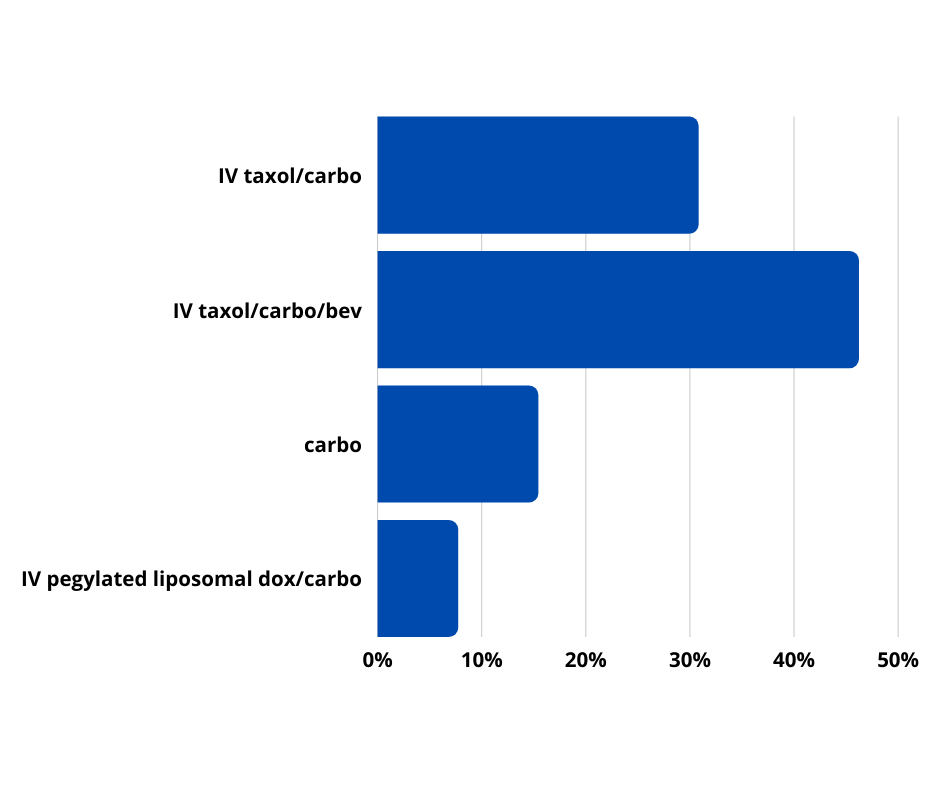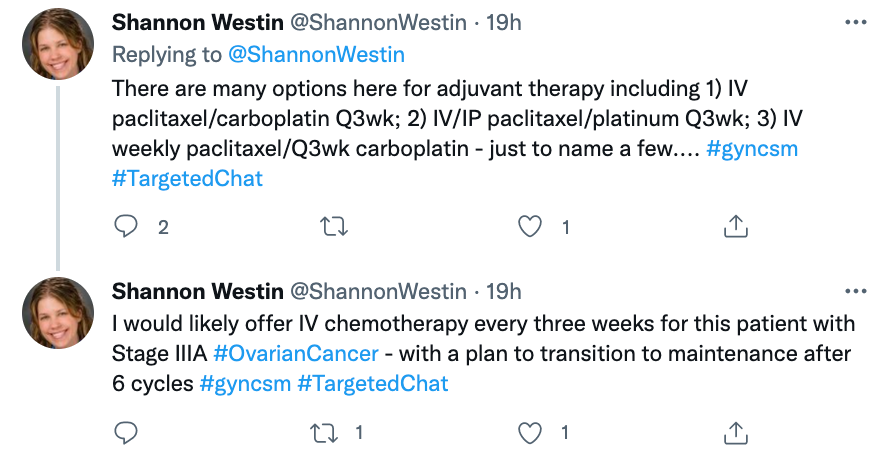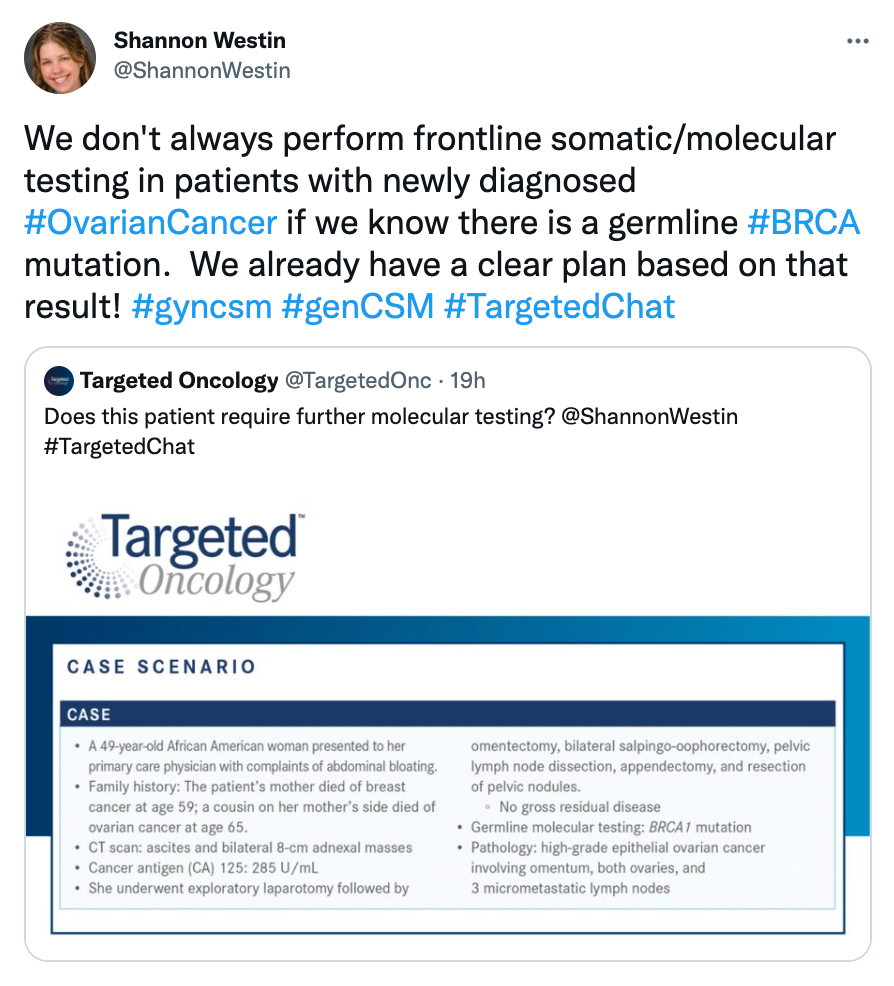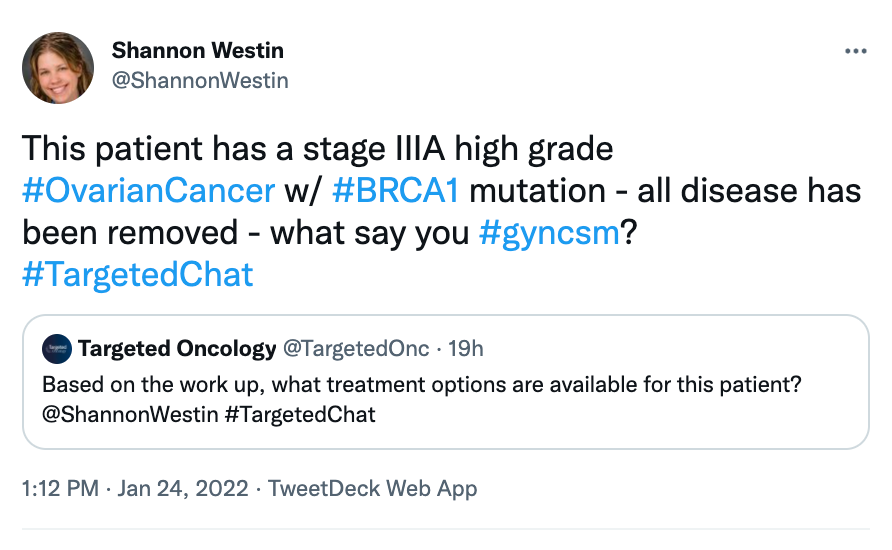Tweet Chat Recap: Westin Discusses Deciding on Initial Treatment of High-Grade Epithelial Ovarian Cancer Followed by Maintenance
In an interview with Targeted Oncology, Shannon N. Westin, MD, MPH, FACOG, reviewed the recent tweet chat around a high-grade epithelial ovarian cancer case.
For oncologists, options for treating patients with high-grade epithelial ovarian cancer have increased in recent years, according to Shannon N, Westin, MD, MPH, FACOG. In the case of a 47-year-old patient who work up showed a good overall prognosis, Targeted Oncology™ took to Twitter for a Tweet Chat around next steps in the patient’s care.
After a germline BRCA1 mutation is identified in the patient, Targeted Oncology first asked Westin whether further molecular testing was required for the patients. Based on Westin’s response, it is possible to do additional testing, but it is not required to begin treatment.
Next, a question about initial treatment caught the interest of other oncologists. From a poll originally shared on Twitter, Westin chose the IV chemotherapy for 3 weeks. It slightly differed from the rest of the voters, who preferred the addition of bevacizumab (Avastin) to the standard chemotherapy doublet.


In an interview with Targeted Oncology, Shannon N. Westin, MD, MPH, FACOG, associate professor, Department of Gynecologic Oncology and Reproductive Medicine, Division of Surgery, The University of Texas MD Anderson Cancer Center, and physician, Department of Gynecologic Oncology and Reproductive Medicine, Division of Surgery, Lyndon Baines Johnson Hospital, in Houston, TX, reviewed the tweet chat around a high-grade epithelial ovarian cancer case.
TARGETED ONCOLOGY: What are the key unmet needs for patients with high-grade epithelial ovarian cancer?
Westin: When we're talking about high grade epithelial, ovarian cancer, we've made a lot of progress. I think that some of the good stuff that's happened over the last few years is really understanding which patients may benefit the most from maintenance and being able to have effective maintenance strategies, which really wasn't something that that we have had for most of the time that I've been practicing and taking care of women with ovarian cancer. But we still have some issues. I think it's a straightforward choice now, to utilize PARP inhibitor maintenance for patients with a BRCA mutation. However, for women that their tumor does not have a BRCA mutation or does not have homologous recombination deficiency, the results of PARP inhibition alone or with in combination with bevacizumab haven't been as exciting as we'd hoped. And so that still remains a critical unmet need is determining what it would be a successful option for maintenance for patients with a homologous recombination proficient tumor.
What treatment options are most promising and what ongoing research looks promising right now?
There are a number of trials that are exploring novel combinations strategies in the maintenance setting for patients with newly diagnosed ovarian cancer and specifically combining things like immunotherapy with anti-angiogenics and with PARP inhibitors to see if we can overcome any innate or adaptive resistance in those settings. So, I think those are exciting. And we've got a number of large trials that women have participated in. So, hopefully, over the next few years, we'll be seeing the results for that and hopefully changing practice. But if that's not successful, or if it's not 100% successful, which when is anything we do ever 100% successful.
There are a number of novel combinations strategies that are in the recurrent setting, which I think potentially could be moved up front. In addition, I think another exciting area of research is on antibody drug conjugates. In ovarian cancer, we have a number of novel options and novel targets there that are looking really exciting in ongoing research, and we expect to potentially have some more FDA-approved options over the next year or so.
Thinking of the case that was discussion during the tweet chat, what were some of the interesting characteristics with the patient?
The critical pieces are histology and diagnosis. So, she had a stage III, high-grade ovarian cancer. The good thing for her was she was able to undergo an upfront surgery and did have an optimal cytoreduction to no gross residual disease, which gives her a positive prognosis. And then of course, she was appropriately tested for germline mutations in BRCA and was found to have a BRCA1 mutation which is critical.
She did have a family history that was suspicious for hereditary cancer syndrome. But it's always important to know we want to be testing any patient with a high-grade epithelial ovarian cancer because the population is not limited to patients with a family history or patients that are very young at diagnosis. It really does span anyone with a high-grade epithelial ovarian cancer.
What were your thoughts on the choice of IV paclitaxel in combination with carboplatin and bevacizumab as initial treatment for this patient in our Twitter poll?
I think it's very reasonable. It's an FDA-approved regimen. We saw excellent benefit with progression-free survival for the addition of bevacizumab to the chemotherapy combination. And that is something that can be transitioned into maintenance strategy with bevacizumab and a PARP inhibitor. For patients like this who had really microscopic stage III disease, you also can choose to utilize the chemotherapy on its own without bevacizumab and then transition to the PARP inhibitor alone. So, I think all the options were good ones. And it really does get into details about people's practice patterns and what they feel most comfortable with.
The poll also showed that IV pegylated liposomal in combination with carboplatin was the least popular upfront choice. What is the efficacy around this treatment and why do you think few oncologists voted for it?
There's efficacy data to indicate that this is an acceptable option in the upfront setting. But I think the tried and true standard of care has been the paclitaxel and carboplatin based backbone. And I think that's what most people are comfortable with and what most patients tolerate very well. So, I think the pegylated liposomal doxorubicin is more utilized as an alternative strategy for patients that perhaps have pre-existing adverse events such as neuropathy that preclude the use of taxane or put them at higher risk for adverse events from a taxane. That’s probably the rationale and why the majority of our poll participants didn't choose that option.
During the tweet chat, you talked about your choice of PARP inhibitor therapy in the maintenance setting. Can you explain your choice?
We have great data now for a PARP maintenance with PARP inhibition in any woman with ovarian cancer, but it does seem that certainly having the biomarker matters. So, women that have either a germline or somatic BRCA mutation benefit the most from the use of a PARP inhibitor in the maintenance setting. If they don't have mutation, women that the finding of homologous recombination deficiency in their tumor will also benefit but maybe not as dramatically as those women with a BRCA mutation. And then even women that have no biomarker who are BRCA wild type and homologous recombination proficient can still benefit from a PARP inhibitor. However, it's not as profound of an effect.
These data are based on a number of upfront studies, including the SOLO1 study that explored olaparib as a single agent, in women with BRCA-mutant ovarian cancer. The premise study which looked at niraparib single-agent in an all comers population, so that's where our data for patients with homologous recombination proficient tumors come from. And that indication allows for us to treat any patient with niraparib. And then also the PAOLO-1 study, which combined not just olaparib but bevacizumab with the PARP inhibitor so that to see if that would provide additional benefit. Now, that study did not have an olaparib-only arm, so we don't know, for patients with BRCA mutations, if they would do better with the 2-drug combination as opposed to 1. What most of us do is if we've decided to utilize bevacizumab upfront, we will continue it and add the PARP inhibitor. But if we have not used bevacizumab, we won't add it in the maintenance setting.
Do you have any additional thoughts about this case?
I think it's a great case and I would anticipate this patient would do very well. I think her early onset into a physician's clinic and getting right into a GYN oncologist’s hands was critical going under undergoing the right surgery and then getting the right chemotherapy and maintenance options. The other point would be when you identify a BRCA mutation in a patient like this, you want to perform something called cascade testing, which is where her family is notified and tested as well, so that hopefully we can prevent future cases of cancer in their family.
Avutometinib/Defactinib Leads to Positive Response, Survival Data in Ovarian Cancer
October 18th 2024The completion of a new drug application for the combination of avutometinib and defactinib in KRAS-mutant ovarian cancer is expected to be finalized with the FDA by the end of the month.
Read More

